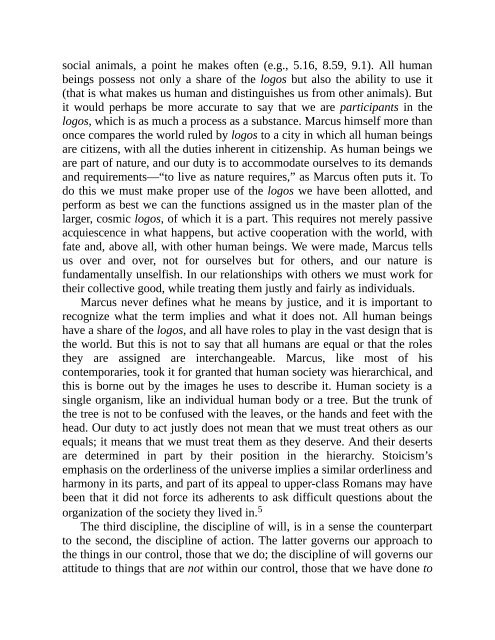9781945186240
Create successful ePaper yourself
Turn your PDF publications into a flip-book with our unique Google optimized e-Paper software.
social animals, a point he makes often (e.g., 5.16, 8.59, 9.1). All human<br />
beings possess not only a share of the logos but also the ability to use it<br />
(that is what makes us human and distinguishes us from other animals). But<br />
it would perhaps be more accurate to say that we are participants in the<br />
logos, which is as much a process as a substance. Marcus himself more than<br />
once compares the world ruled by logos to a city in which all human beings<br />
are citizens, with all the duties inherent in citizenship. As human beings we<br />
are part of nature, and our duty is to accommodate ourselves to its demands<br />
and requirements—“to live as nature requires,” as Marcus often puts it. To<br />
do this we must make proper use of the logos we have been allotted, and<br />
perform as best we can the functions assigned us in the master plan of the<br />
larger, cosmic logos, of which it is a part. This requires not merely passive<br />
acquiescence in what happens, but active cooperation with the world, with<br />
fate and, above all, with other human beings. We were made, Marcus tells<br />
us over and over, not for ourselves but for others, and our nature is<br />
fundamentally unselfish. In our relationships with others we must work for<br />
their collective good, while treating them justly and fairly as individuals.<br />
Marcus never defines what he means by justice, and it is important to<br />
recognize what the term implies and what it does not. All human beings<br />
have a share of the logos, and all have roles to play in the vast design that is<br />
the world. But this is not to say that all humans are equal or that the roles<br />
they are assigned are interchangeable. Marcus, like most of his<br />
contemporaries, took it for granted that human society was hierarchical, and<br />
this is borne out by the images he uses to describe it. Human society is a<br />
single organism, like an individual human body or a tree. But the trunk of<br />
the tree is not to be confused with the leaves, or the hands and feet with the<br />
head. Our duty to act justly does not mean that we must treat others as our<br />
equals; it means that we must treat them as they deserve. And their deserts<br />
are determined in part by their position in the hierarchy. Stoicism’s<br />
emphasis on the orderliness of the universe implies a similar orderliness and<br />
harmony in its parts, and part of its appeal to upper-class Romans may have<br />
been that it did not force its adherents to ask difficult questions about the<br />
organization of the society they lived in. 5<br />
The third discipline, the discipline of will, is in a sense the counterpart<br />
to the second, the discipline of action. The latter governs our approach to<br />
the things in our control, those that we do; the discipline of will governs our<br />
attitude to things that are not within our control, those that we have done to


